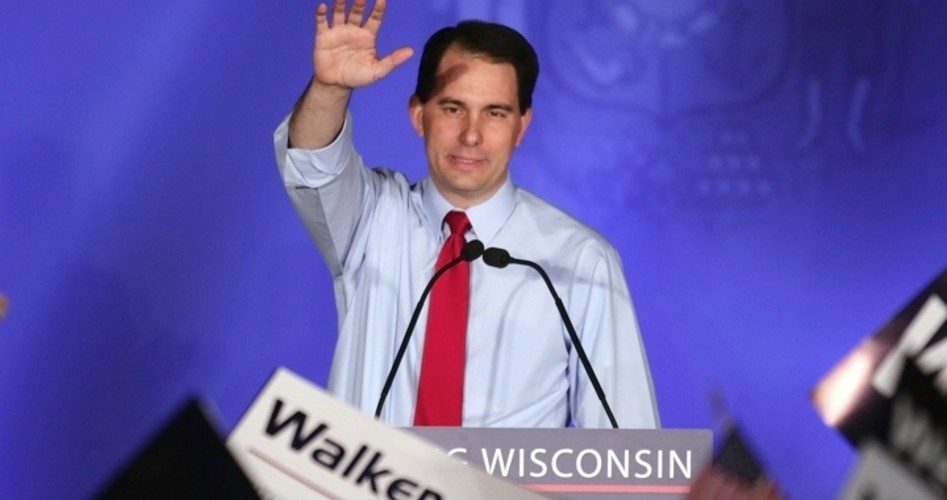
In a race closely watched by a nation anticipating a contentious election cycle in November, Wisconsin Governor Scott Walker survived a highly volatile recall attempt against him June 5, cruising to a 54 to 45 percent decisive victory over challenger Tom Barrett, the current mayor of Milwaukee. The result mirrored Walker’s defeat of Barrett in Wisconsin’s 2010 gubernatorial election, and makes him the first governor in U.S. history to survive a recall attempt.
The win by Walker also marks a humiliating end to an effort begun last November by state school teachers and other public employees after Walker ended their union’s collective bargaining privileges, requiring them to pay more personally to their pension funds and health care (though still far less than the state and national average). In November the 23,000-member Wisconsin State Employees Union took the lead in a recall effort that garnered over 900,000 signatures demanding that the Republican governor be removed from office. But the fact that no quality candidates stepped forward to challenge Walker, and that President Obama did nothing to help Barrett’s campaign, made it apparent that the Democrats had little optimism about winning the recall race.
In his victory speech Gov. Walker said that the election results confirmed that Wisconsin voters were on board with his attempts to reign in government spending. “Tonight we tell Wisconsin, we tell our country, and we tell people all across the globe that voters really do want leaders who stand up and make the tough decisions,” Walker told supporters celebrating with him at his campaign headquarters in Waukesha as polling results assured his victory.
The Milwaukee Journal-Sentinel, which had come out in favor of Walker early in the recall campaign, reported that the governor planned to meet with his cabinet on June 6 “to focus on the economy and said he hoped to soon bring Democratic and Republican lawmakers together to meet over brats, burgers, and beer.” When his supporters began booing at the mention of Barrett, Walker quickly cut them off, saying that “tomorrow is the day after the election, and tomorrow we are no longer opponents. We are one as Wisconsinites.”
By 10 p.m. Wisconsin time on the night of the election Walker’s victory was assured, and an hour after the Associated Press had called the race, the Milwaukee mayor phoned the governor to concede. Later Barrett admonished supporters gathered to commiserate at a hotel convention center in downtown Milwaukee: “Never, ever stop doing what you think is right. That’s what makes this such a great country.”
In addition to the Walker redo, Lt. Gov. Rebecca Kleefisch also survived a recall as did three of four Republican state senators. But as of this writing Democratic candidate John Lehman was claiming victory over recalled GOP State Senator Van Wanggaard in Racine County. If those results stand, the victory would give the Democrats a one-vote edge in the Senate, a decided disadvantage for Walker as he finishes out his first term.
Nonetheless, the Republican Party viewed the Walker victory as positive forward momentum in the months ahead of the national election in November. Republican National Committee Chairman Reince Priebus said that “Wisconsin has given their stamp of approval to Gov. Walker’s successful reforms that balanced the budget, put people back to work, and put government back on the side of the people.”
Priebus added that President Obama’s conspicuous absence from the Wisconsin campaign was significant. “I think the Democrats are going to have a circular firing squad on their hands for about three weeks,” the Journal-Sentinel quoted Priebus as saying. “Obama is going to show up in a month or two and say, ‘Hey guys, remember me, you need to help me get re-elected.’ I think a lot of Democrats around here are very disappointed in this president. They’re going to look back at him, ‘Thanks a lot, pal, we appreciate the help.’ ”
Republican strategists expressed optimism that the Walker victory would send a signal across the nation and give positive momentum come November, especially in the presidential race. Republican presidential candidate Mitt Romney issued a statement following Walker’s win declaring that the governor’s decisive showing would “echo beyond the borders of Wisconsin.” He said Walker had demonstrated that “citizens and taxpayers can fight back — and prevail — against the runaway government costs imposed by labor bosses. Tonight voters said no to the tired, liberal ideas of yesterday, and yes to fiscal responsibility and a new direction.”
While Republican celebrities touted the victory as a loud-and-clear affirmation of their dominance in the state, many observers said that the vote simply reflected the opinion of rank-and-file Wisconsin voters that the recall was a colossal waste of time, effort, and money. Estimates place the cost of the recall to Wisconsin taxpayers at an estimated $18 million. As for the candidates, more than “$66 million was spent on the race as of May 21, making it easily the most expensive in Wisconsin history,” reported the Appleton, Wisconsin Post Crescent. “That money was spent on an all-out barrage of television ads, direct mail, automated calls, and other advertising that permeated the state for months.”
Although Walker opponents attempted to frame the recall as a grassroots campaign for government accountability, ultimately voters realized that the effort was founded on little more than the anger of state employees unhappy at having to give up an entitlement they had enjoyed unchallenged for decades. Political observers noted that ultimately that rage did not play well with the majority of Wisconsinites, who saw the recall effort as an inconvenience foisted upon the state by a childish minority.
“Recall was never meant to be used just because you don’t like the way the other side is governing,” observed Jenny Beth Martin of the group Tea Party Patriots, which the New York Times said made tens of thousands of calls for Walker in the days leading up to the election.
One Green Bay voter, Katy Tomlanovich, a teacher at a local technical college, reflected the feelings of a majority of those who cast their ballot for Walker, telling the Washington Post that she had voted for Walker in 2010 “because I realized we have to do something about the deficit. I voted for him in the recall because I don’t believe recall elections are meant for what they’re doing with it.” Tomlanovich, who said she would be inclined to vote for Obama in November, told the Post that she felt recalls were meant to remove corrupt politicians, not those who make decisions that are unpopular with some individuals and groups. “Scott Walker is actually doing something about [spending],” she said, “and I think he should be allowed to serve the rest of his term.”
Photo: Wisconsin Republican Gov. Scott Walker waves at his victory party, June 5, 2012, in Waukesha, Wis.: AP Images



